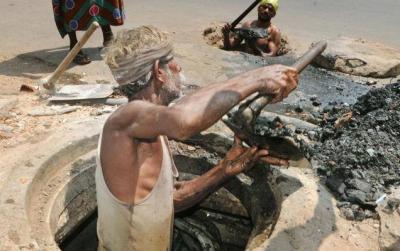New Delhi, July 29: Despite the deaths of over 40 manual scavengers in the past six months, the Union budget has made no mention of this ongoing crisis, according to data compiled by Safai Karmachari Andolan (SKA), a civil society organization dedicated to eradicating manual scavenging.
The SKA reported that 43 manual scavengers have died between February 1 and July 23, a period spanning from the vote-on-account to the presentation of the Union budget for 2024-25 by Finance Minister Nirmala Sitharaman. Congress Rajya Sabha member Jebi Mather Hisham highlighted the issue, pointing to the recent death of a 47-year-old sanitation worker in Kerala as a stark reminder of the ongoing risks faced by these workers.
The worker, who was attempting to clean waste from a canal in Trivandrum, slipped and drowned, his body discovered after a 46-hour search. Hisham emphasized that sanitation workers often operate without protective gear or proper training, facing life-threatening conditions despite a ban on manual scavenging.
Twelve opposition members supported Hisham’s call for compensation for the deceased worker’s family and the implementation of an effective urban waste management plan. While the government has introduced the National Action for Mechanised Sanitation Ecosystem (Namaste) to replace an earlier scheme, funding for the program has been inconsistent. Initially allocated Rs 97 crore in the 2023-24 budget, the amount was reduced to Rs 30 crore in the revised budget but has now been increased to Rs 117 crore for the current year.
SKA national convener Bezwada Wilson criticized the government’s lack of commitment to the welfare of manual scavengers, describing the allocated funds as “very paltry.” He noted that the finance minister did not mention manual scavengers in her budget speech, indicating a disregard for their lives.
Wilson highlighted that manual scavenging remains widespread in states like Uttar Pradesh, Madhya Pradesh, Jammu and Kashmir, and Bihar, but the government is reluctant to acknowledge the issue. The SKA regularly submits memoranda to the Ministry of Social Justice and the National Human Rights Commission, seeking compensation for families of deceased sanitation workers and a comprehensive rehabilitation plan. However, Wilson stated that these efforts have gone unanswered.
According to The Wire, he further condemned the government’s failure to regulate local authorities, which do not provide necessary safety equipment or training for sanitation workers. Wilson noted that most manual scavengers are Dalits and criticized the government for failing to recognize deaths in sewers and septic tanks as related to manual scavenging, instead often labeling them as accidental.
Despite repeated calls for action and recognition, the plight of manual scavengers continues to be overlooked in government policies and budgets, leaving many vulnerable to hazardous working conditions.




